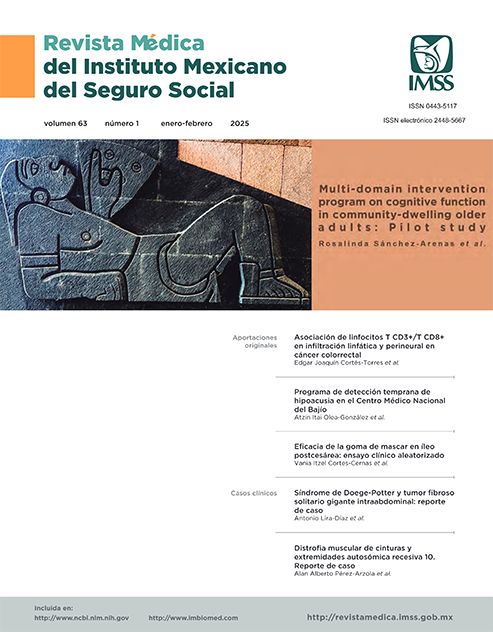Síndrome de Doege-Potter y tumor fibroso solitario gigante intraabdominal: reporte de caso
##plugins.themes.themeEleven.article.main##
Palabras clave
Hipoglucemia, Tumor Fibroso Solitario, Síndrome de Doege-Potter, Tumor Maligno
Resumen
Introducción: el síndrome de Doege-Potter se ha reportado en tumores fibrosos solitarios y se caracteriza por hipoglucemia severa, sostenida y refractaria asociada a tumores no pancreáticos, en particular al tumor fibroso solitario de pleura. Se reporta un caso poco común de tumor fibroso solitario asociado con hipoglucemia severa y localización abdominal.
Caso clínico: mujer de 63 años que se presentó con hipoglucemia de difícil control, cuadro de obstrucción intestinal y subsecuente sepsis. Los estudios de imagen mostraron una neoplasia de predominio abdominal, infiltrante en columna vertebral. El estudio histopatológico de la biopsia y la pieza quirúrgica confirmaron un tumor fibroso solitario. Una vez resecado, la hipoglucemia remitió y se diagnóstico síndrome de Doege-Potter.
Conclusión: este caso se destaca por su presentación con hipoglucemia severa refractaria, la ubicación del tumor en el abdomen y la invasión vertebral, dado que la mayoría de los tumores fibrosos solitarios se encuentran en los pulmones y tienen origen en la pleura. Se deben considerar causas poco comunes de hipoglucemia en pacientes no diabéticos, como el síndrome de Doege-Potter.
Referencias
World Health Organization. Classification of Tumours Editorial Board. Soft tissue and bone tumours. 5th ed. Lyon: World Health Organization International Agency for Research on Cancer; 2020.
Sheikh K, Mody A, Haynes AB, et al. Doege-Potter syndrome: A solitary fibrous tumor causing non-islet cell tumor hypoglycemia. JCEM Case Reports. 2024;2(2). Disponible en: https:// pubmed.ncbi.nlm.nih.gov/38405103/
Goldblum JR, Folpe AL, Weiss SW. Enzinger and Weiss’s Soft Tissue Tumors. 7th ed. Elsevier; 2020. Disponible en: https:// www.clinicalkey.com.au/dura/browse/bookChapter/3-s2.0- C20170011588. Retrieved August 22, 2023.
Kempfer L, Hajibandeh J, Ishaque N, et al. Diagnostic utility of RNA sequencing in the assessment of malignant melanoma and benign nevi. Mod Pathol. 2022;35(5):869-78. doi: 10.1038/ s41379-021-01094-3
Pasquali S, Gronchi A, Strauss D, et al. Resectable extra-pleural and extra-meningeal solitary fibrous tumours: A multi-centre prognostic study. Eur J Surg Oncol. 2016;42(7):1064-70. doi: 10.1016/j.ejso.2016.01.023
Wang C, Cao T, Hu G, et al. Recurrence of solitary fibrous tumor of the pleura with hypoglycemia (Doege-Potter Syndrome): a case report description. Front Oncol. 2023;13. Disponible en: https://pubmed.ncbi.nlm.nih.gov/37823058/
Apra C, El Arbi A, Montero AS, et al. Spinal Solitary Fibrous Tumors: An Original Multicenter Series and Systematic Review of Presentation, Management, and Prognosis. Cancers (Basel). 2022;14(12):2839. doi: 10.3390/cancers14122839
Donnellan RB, Govender D, Chite SH, et al. An unusual presentation of solitary fibrous tumor. Spine. 2000;25:749-51.
Hashimoto K, Miyamoto K, Hosoe H, et al. Solitary fibrous tumor in the cervical spine with destructive vertebral involvement: a case report and review of the literature. Arch Orthop Trauma Surg. 2008;128(10):1111-6.
Bouyer B, Guedj N, Lonjon G, et al. Recurrent solitary fibrous tumour of the thoracic spine. A case-report and literature review. Orthop Traumatol Surg Res. 2012;98(7):850-3.
Pinho dos Santos D, Correia R, Carragoso A, et al. Non-islet cell tumor hypoglycemia caused by recurrent pelvic solitary fibrous tumor. Cureus. 2021;13(1). Disponible en: https://pubmed.ncbi. nlm.nih.gov/33633907/
Angelico G, Salvatorelli L, Vecchio GM, et al. Solitary fibrous tumor occurring at unusual sites: A clinico-pathological series of 31 cases with emphasis on its wide morphological spectrum. Pathol Res Pract. 2024;255(155207):155207. doi: 10.1016/j. prp.2024.155207
Lopez-Hinostroza M, Moya-Salazar J, Dávila J, et al. Doege- Potter syndrome due to endothoracic solitary hypoglycemic fibrous tumor. Clin Case Rep. 2022;10(4). doi: 10.1002/ccr3.5611
Dole S, Gupta S, Barthwal MS, et al. Doege Potter syndrome in patient with solitary fibrous tumor of the pleura. Med J Armed Forces India. 2024. doi: 10.1016/j.mjafi.2023.12.004
Mohammed T, Ozcan G, Siddique AS, et al. Doege-Potter syndrome with a benign solitary fibrous tumor: A case report and literature review. Case Rep Oncol. 2021;14(1):470-6. Disponible en: https://pubmed.ncbi.nlm.nih.gov/33976622/
Tariq MU, Din NU, Abdul-Ghafar J, et al. The many faces of solitary fibrous tumor; diversity of histological features, differential diagnosis and role of molecular studies and surrogate markers in avoiding misdiagnosis and predicting the behavior. Diagn Pathol. 2021;16(1). Disponible en: https://pubmed.ncbi. nlm.nih.gov/33879215/
Kallen ME, Hornick JL. The 2020 WHO classification: What’s new in Soft Tissue tumor pathology? Am J Surg Pathol. 2021;45 (1)e1-23. doi: 10.1097/PAS.0000000000001552
Yamada Y, Kohashi K, Kinoshita I, et al. Clinicopathological review of solitary fibrous tumors: dedifferentiation is a major cause of patient death. Virchows Arch. 2019;475(4):467-77. Disponible en: https://pubmed.ncbi.nlm.nih.gov/31392468/
Huang YP, Wang WW, Li P, et al. Malignant solitary fibrous tumors: a clinicopathological and molecular genetic analysis. Zhonghua Bing Li Xue Za Zhi. 2022;51(6). Disponible en: https://pubmed.ncbi.nlm.nih.gov/35673723/
Niedra H, Konrade I, Peculis R, et al. Solitary fibrous tumor with IGF-II-induced non-islet cell tumor hypoglycemia: a case report and molecular characterization by next-generation sequencing. Front Oncol. 2023;13. Disponible en: https://pubmed.ncbi.nlm. nih.gov/37469410/
Fernández-Trujillo L, Bolaños JE, álvarez C, et al. Doege- Potter syndrome and hypoglycemia associated with solitary fibrous tumor of the pleura: Two case reports. Clin Med Insights Circ Respir Pulm Med. 2020;14:117954842096475. doi: 10.1177/1179548420964759
Corsano C, Paradiso M, Laudadio ED, et al. A case report of Doege-Potter Syndrome: A rare cause of hypoglycemia in a patient without diabetes. J Clin Med. 2023;12(12):3984. Disponible en: https://pubmed.ncbi.nlm.nih.gov/37373678/
Schöffski P, Timmermans I, Hompes D, et al. Clinical presentation, natural history, and therapeutic approach in patients with solitary fibrous tumor: A retrospective analysis. Sarcoma. 2020;2020:1-9. Disponible en: https://pubmed.ncbi.nlm.nih. gov/32300277/
Kaneko K, Sawada S, Satake C, et al. Extraordinarily long-inactive solitary fibrous tumor transformed to produce big insulinlike growth factor-2, leading to hypoglycemia and rapid liposarcoma growth: a case report. BMC Endocr Disord. 2020;20(1). Disponible en: https://pubmed.ncbi.nlm.nih.gov/32993631/


